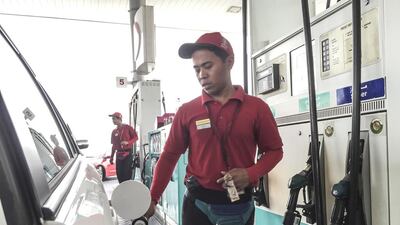Almost a year after the oil price began to drop, it is reasonable for motorists to wonder why this has not been reflected at the petrol pump. After all, oil is now selling on the global market for about half the price it was this time last year, and in many countries the retail price of petrol has fallen substantially. Although the UAE is itself a major oil producer, there are good arguments why the price we pay should be maintained.
While it may be high by regional standards, our average pump price of Dh1.72 per litre compares favourably with those in New York (about Dh2.1 per litre), Sydney (Dh4.2) and London (Dh6.8). Moreover, the retail price has long been heavily subsidised by the government, meaning we have been paying too little for many years. As energy minister Suhail Al Mazrouei said this week in response to a question posed by the Federal National Council, subsidies tend to encourage higher consumption of petrol and discourage conservation. They are also a burden on the national budget, using funds that could be better spent on other programmes and services.
In Europe and the US, higher petrol prices have led to a move towards smaller, more fuel-efficient cars, along with hybrids and electric vehicles. In the UAE, many drivers still opt for thirsty large cars, partly because the price of petrol is no deterrent. Dropping the price now would create a problem for the future. When oil prices go up again, as they no doubt will, consumers will resist a petrol price rise, thus increasing the burden of subsidies on the country’s coffers. As the minister said, the government is likely to reduce the subsidies here, in line with International Monetary Fund recommendations and global efforts to help reduce carbon dioxide emissions.
If we are going to be serious about sustainability, we should accept that the price we pay for petrol is already fair and reasonable, and may even have to increase in the future. And that starts with each one of us rethinking the size of car we need and the number of trips we have to make, as well as considering environmentally friendly options such as walking more, cycling or taking public transport.

